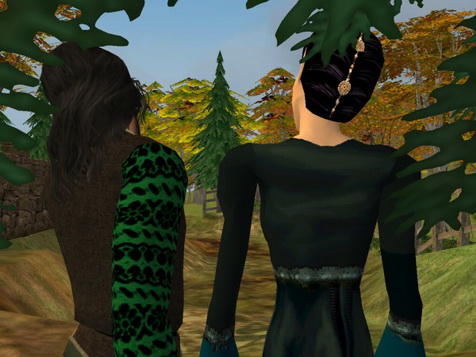
“I wonder,” the Duke said with studied carelessness, “whether you truly believe that I am so tedious a man as to invite ladies to visit the flax barns with me.”
Lasrua smiled. “It is never tedious visiting anything in your company.”
“Ah! I shall take that as a fine compliment: my company redeems the tedium even of flax barns. Wait until I show you the malt-house!”
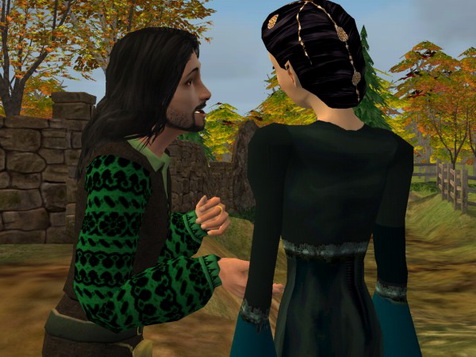
“Besides,” she smiled slyly, “I thought you invited me to relieve the tedium for yourself.”
“Aie!” He clutched his side as if mortally wounded. “I am more than tedious! I am tiresome!”
“You are neither,” she insisted, laughing.
She added to her firmness by taking his arm and squeezing it, though once she had it, she found she did not care to let it go. Alred’s arm was more than a show of courtesy, and once she was leaning on its strength, she realized she had scarcely more than tottered along until now.
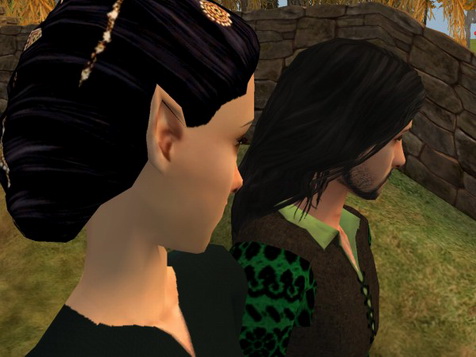
He seemed to realize it, too, for he stopped his squirming at his imaginary wound, straightened his back, and walked on soberly for a while in her shadow. A skylark streaked back and forth across the road before them, from field to field, though it was far too late in the year for her to have a nest on either side.
“My dear,” he finally said, “the truth is that I am bothersome. So you are about to find me.”
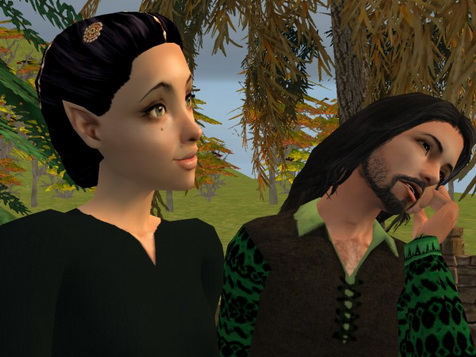
“I cannot believe it.”
“Meddlesome, I should have said. I’m about to meddle, and you won’t be able to deny it.”
“Oh.” In spite of his arm, a hot wave of dizziness crashed over her.
“My fir – Matilda – used to ‘meddle’, as I called it, and I used to scold her for it. And nevertheless, since she went away, I’ve carried on the tradition, I’m afraid.”
“Mmm.”
He paused and stared off over her shoulder, his gaze so intent that when she turned away to look, it was easier to believe her own eyes were deceiving her than that he was seeing something that was not there.
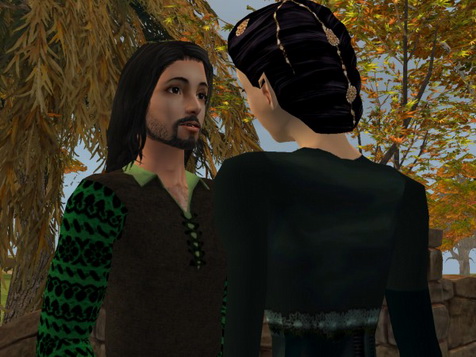
Lasrua discreetly left him to his vision and shuffled over to the fence. There in the fallow field the lark was crouching her spangled breast to the earth, but her head was high and alert, and her black eyes stared boldly back into Lasrua’s green.
Soon Alred followed, dragging his boots noisily through the dry stems of grass and weeds to warn Lasrua of his arrival.
“I know you won’t believe this,” he said slyly, “but I shall be forty-three in a few weeks.”
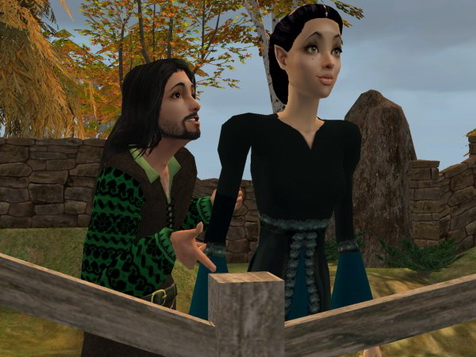
“Never!” she gasped and giggled.
“As true as I am tiresome! And in my forty-three years of life on this verdant earth, there have been a good many things I regret having said and done, and equally many things I wish I had said and done, and the net result is that I am no wiser than I was at your age, unless it be that I am now at least aware that I am a fool.”
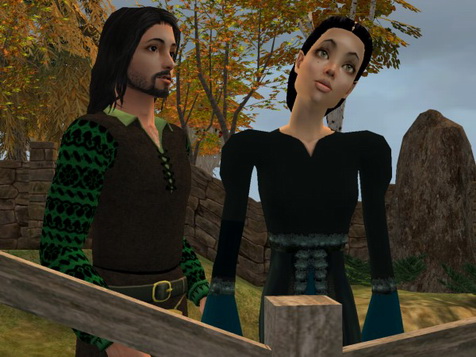
“I can’t believe that either,” she murmured.
“Ah! Please withhold your opinion on the matter of my foolishness until I have been granted the opportunity to prove it with what I am about to say.”
Lasrua shrugged, and Alred stepped up to the fence beside her. At first he only dug at the dry wood of the fencepost with his thumbnail, long enough that Lasrua finally turned her attention back to the bird. At that moment he spoke.
“I should have liked to have spoken to your sister Catan, but I do not like to scold a lady who has a husband who can do it himself. You yourself have a brother and a father, but although they seem to be of a like mind with me, I do not know the customs of elves. However, I do know many bitter truths about men, and I also have daughters almost your age. Therefore I believe I may presume to speak to you, and fear that I shall never forgive myself if I do not.”
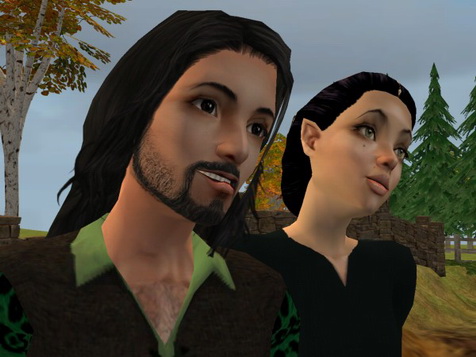
It was an ominous preamble. “Do you mean to scold me?” she asked hopefully. Perhaps he only wished to correct her for some giggling indiscretion of those brief weeks of her friendship with Eithne.
“No, my dear. I wish to warn you.”
Then she was certain she knew what he meant to say.
“I begin with an enormous assumption, Rua, so if I err, I beg your forgiveness. You need not admit or deny it if you do not wish. I only ask that you listen politely, against the day that my advice should prove useful to you or some young friend of yours. Will you?”
“Of course…” she murmured.
“You are very gracious. My warning is this: some of the most interesting men are not worthy of the love of good ladies.”
He stepped forward and leaned his arms on the fence, staring out again at something or someone Lasrua could not see.
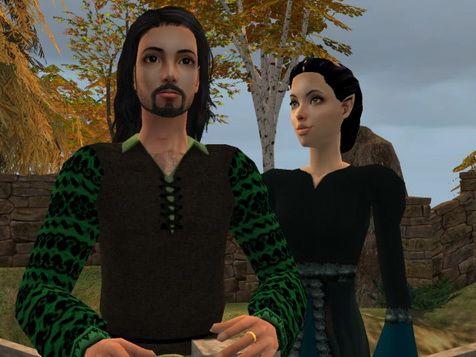
She began to wonder whether he meant to limit his warning to that. He did not.
“His family is remarkably proud of him, my dear, but in truth, Catan’s cousin Malcolm is a coward. They think him brave because the King of Scots trusts him with dangerous messages, because he has been here and been there, and fought and won, and killed and survived, and broken hearts and spared his own, and so on. But he is a coward. The proof is that he is not here today.”
Lasrua’s heart was pounding, and with every beat another wave of dizziness washed over her. She opened her mouth to argue, to protest, but she was too weak, and in truth she had very little argument to offer.
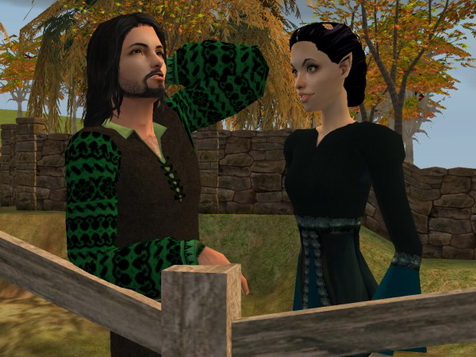
“What I am about to say will seem very cruel, but I believe it is the sort of operation that hurts very much at the time, but saves one from much lingering agony afterwards. Malcolm is a coward, but I must not allow you to believe he is staying away because he is frightened of his love for you. Men like that don’t love like that. He is staying away because he does not want to have to face you again. The tears of a lovelorn young lady are nothing more to him then a tedious consequence of his little love-games, and he does not even have the courage to own up to them.”
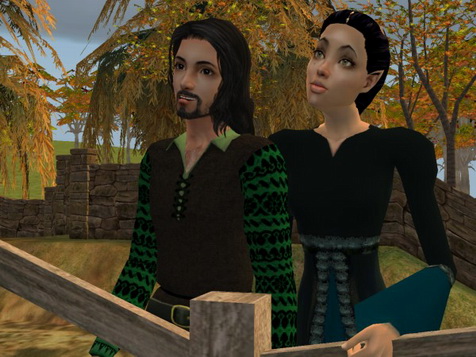
Lasrua had learned how to cry silently, but she did not yet know how to make her tears invisible. She abandoned her attempts to find an argument and concentrated all her strength on drying her tears as soon as they appeared in her eyes.
He had spoken truly: it hurt very much. She had not realized how much hope she had drawn from Malcolm’s failure to return to Lothere after setting forth on the journey. She had not realized how baldly foolish she must seem for finding proofs of love in signs of utter disregard.
“There is one thing I cannot forgive him – ” Alred began angrily, but then he hesitated. “No,” he mused, “in fact there are many things I cannot forgive him, but this one is of the most recent vintage.”
He heaved himself up onto his anger again and continued: “I can forgive a man for wanting to kiss a lady as lovely as you – and I can even forgive him for doing it, I suppose, if it is not disagreeable to her. But I cannot forgive what he said to you that day.”
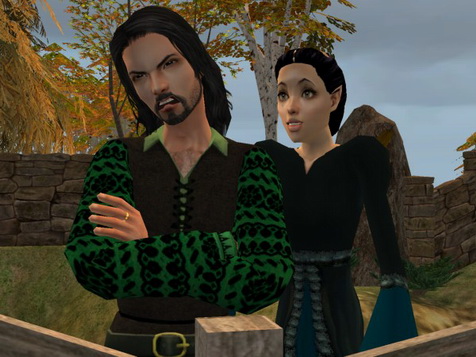
Lasrua did not even know how he knew of it. Perhaps her brother had told him. Perhaps everyone knew.
Her head hung low beneath the veil of foolishness she had not even known she wore before the world. At last the lark in the field lowered her own tiny head out of some feminine fellow-feeling. She had no mate and no nest herself at this season. But for birds would come the spring.
“It was the cruelest thing he could have said, and whether he knew it or not, I think it abominable. Asking you to come with him, when he did not even want you to come, or would have sent you home to your father soon after, ruined…”
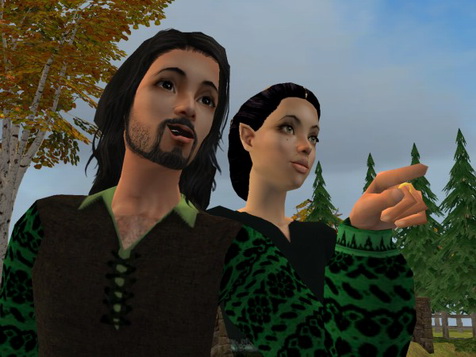
His hand and his voice shook from the kicks and bucks of his tight-reined anger, until Lasrua herself grew anxious. A man, she would not have wanted to meet him alone with his sword and that long-smoldering rage.
“It was the cruelest thing, my dear lady. Though it was the worst possible choice you could have made, I fear you are condemned to spend the rest of your life wondering what would have happened if you had gone. Though you find great happiness – and I pray you do – there are moments of dissatisfaction and melancholy in every life, and I curse him for making them harder to bear.”
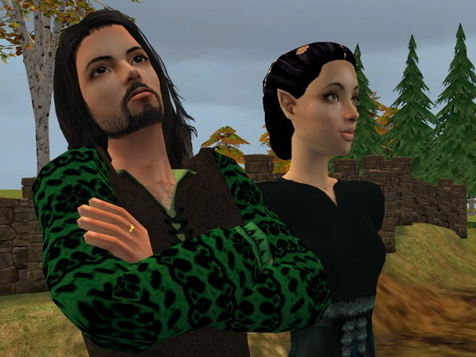
He crossed his strong arms over his chest and fell silent. Perhaps he watched the lark. He did not speak again until the little bird had beat herself into the air with her pointed wings and flitted across the road into the opposite field.
“It was the same with our old Queen,” he muttered, “if you wonder how I have gained such remarkable insight in slightly less than forty-three years. He did the same to her. He poisoned her love for Sigefrith, though he could never have it for himself. He poisoned her life.” He snorted, then spoke more gently, as if only then remembering to whom he spoke. “You do know she was young Colban’s mother, do you not?”
“Yes…”
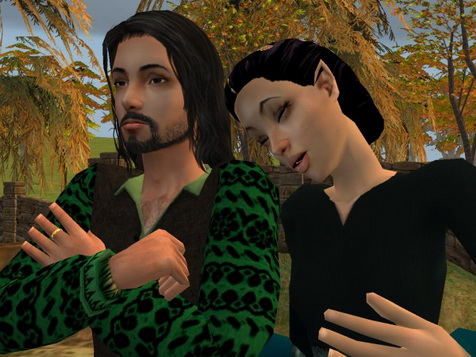
He nodded.
In the silence that followed, the lark returned, nestling herself miserably back into the empty hollow she had just left. Her dark eyes closed, and her head disappeared into a ruff of feathers that trembled in the slow wind.
Lasrua longed to leap the fence and lie down beside her fellow female in the fallows, amid the knobby, weed-grown furrows of the June plowing. She too felt the nest-yearning all out of season, and although barren.
“If I seem virulent,” Alred sighed, “you must understand that I have a Malcolm of my own. You have met Leofric’s daughter Peleia, have you not?”
“Yes.”
“You know Matilda was her mother.”
“Yes.”
He idly slapped the flat of his hand against the fence post, startling the lark into fleeing for the trees, though he did not seem to notice.
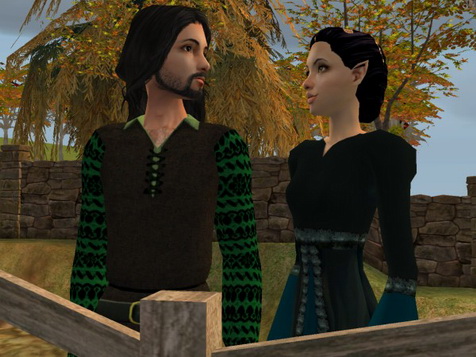
“It does not make what I say less true, however,” he cautioned. “Perhaps more. Even if I am not granted the plenitude of my forty-three years, I shall not have lived in vain if I have spared you what those two ladies endured. That is why I spoke.”
“I…” She could not quite thank him. “…see.”
He walked behind her, but as he went by, he took her hand and passed it through the crook of his arm to lead her away.
“Let us go on,” he said. “I am but an uninteresting man who likes the tedium of a visit to a flax barn.”
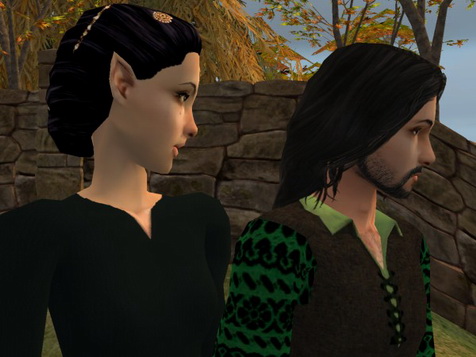








Oh Alred.